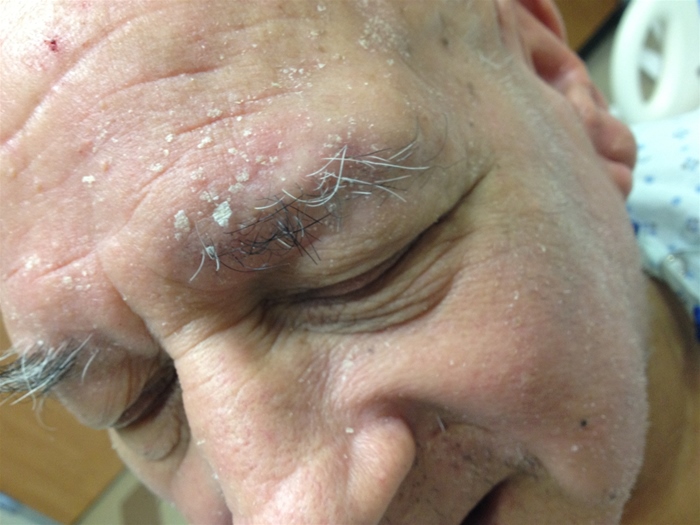A 62-year-old man comes to the community health center due to a "flaky and itchy" scalp. He is uncertain when the symptoms began and believes his brother has a similar problem. The patient has not attempted any specific treatments but washes his hair with a mild shampoo every other day and washes his face with cold water once daily. Medical history is notable for coronary artery disease, type 2 diabetes mellitus, benign prostatic hyperplasia, and diverticulosis. The patient is a recovering alcoholic and has lived in a group home for the last 3 months. Vital signs are normal. Physical examination shows oily skin with faint erythema and scaling of the scalp, eyebrows, and ears, as shown below. During the course of the visit, the patient repeatedly scratches his head and eyebrows, but the remainder of the skin examination is normal.  The patient returns to the clinic after 4 weeks of treatment. His rash has nearly resolved, but he is concerned because his brother developed recurrent symptoms after similar treatment. Which of the following is the most appropriate guidance for long-term management of this patient's condition?
The patient returns to the clinic after 4 weeks of treatment. His rash has nearly resolved, but he is concerned because his brother developed recurrent symptoms after similar treatment. Which of the following is the most appropriate guidance for long-term management of this patient's condition?
A) Avoiding contact with the offending agent is needed to prevent recurrence.
B) Clothing and bed linens should be laundered to eliminate the causative agent.
C) Household members should be treated to prevent relapse.
D) One course of treatment usually leads to long-term remission.
E) Weekly re-treatment may be needed to prevent recurrence.
Correct Answer:
Verified
Q171: A 42-year-old Caucasian woman comes to the
Q172: A 41-year-old woman comes to the office
Q173: A 41-year-old man comes to the physician
Q174: A 13-year-old boy is brought to the
Q175: A 28-year-old Caucasian woman presents to the
Q177: A 65-year-old man comes to the office
Q178: A 41-year-old man comes to the physician
Q179: A 20-year-old woman comes to the office
Q180: A 43-year-old woman comes to the physician
Q181: A 16-year-old girl is brought to the
Unlock this Answer For Free Now!
View this answer and more for free by performing one of the following actions

Scan the QR code to install the App and get 2 free unlocks

Unlock quizzes for free by uploading documents